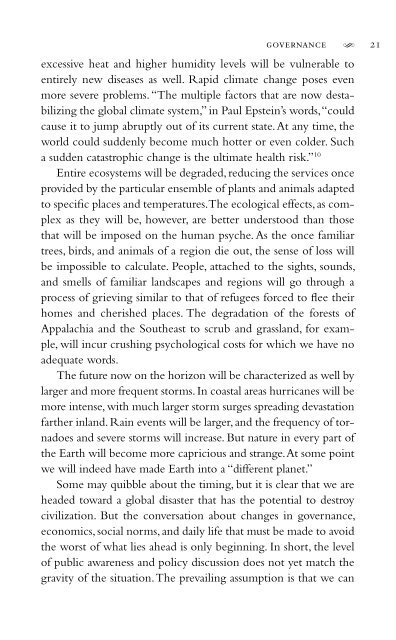Down to the wire : confronting climate collapse / David - Index of
Down to the wire : confronting climate collapse / David - Index of
Down to the wire : confronting climate collapse / David - Index of
Create successful ePaper yourself
Turn your PDF publications into a flip-book with our unique Google optimized e-Paper software.
governance S 21<br />
excessive heat and higher humidity levels will be vulnerable <strong>to</strong><br />
entirely new diseases as well. Rapid <strong>climate</strong> change poses even<br />
more severe problems. “The multiple fac<strong>to</strong>rs that are now destabilizing<br />
<strong>the</strong> global <strong>climate</strong> system,” in Paul Epstein’s words, “could<br />
cause it <strong>to</strong> jump abruptly out <strong>of</strong> its current state. At any time, <strong>the</strong><br />
world could suddenly become much hotter or even colder. Such<br />
a sudden catastrophic change is <strong>the</strong> ultimate health risk.” 10<br />
Entire ecosystems will be degraded, reducing <strong>the</strong> services once<br />
provided by <strong>the</strong> particular ensemble <strong>of</strong> plants and animals adapted<br />
<strong>to</strong> specifi c places and temperatures. The ecological effects, as complex<br />
as <strong>the</strong>y will be, however, are better unders<strong>to</strong>od than those<br />
that will be imposed on <strong>the</strong> human psyche. As <strong>the</strong> once familiar<br />
trees, birds, and animals <strong>of</strong> a region die out, <strong>the</strong> sense <strong>of</strong> loss will<br />
be impossible <strong>to</strong> calculate. People, attached <strong>to</strong> <strong>the</strong> sights, sounds,<br />
and smells <strong>of</strong> familiar landscapes and regions will go through a<br />
process <strong>of</strong> grieving similar <strong>to</strong> that <strong>of</strong> refugees forced <strong>to</strong> fl ee <strong>the</strong>ir<br />
homes and cherished places. The degradation <strong>of</strong> <strong>the</strong> forests <strong>of</strong><br />
Appalachia and <strong>the</strong> Sou<strong>the</strong>ast <strong>to</strong> scrub and grassland, for example,<br />
will incur crushing psychological costs for which we have no<br />
adequate words.<br />
The future now on <strong>the</strong> horizon will be characterized as well by<br />
larger and more frequent s<strong>to</strong>rms. In coastal areas hurricanes will be<br />
more intense, with much larger s<strong>to</strong>rm surges spreading devastation<br />
far<strong>the</strong>r inland. Rain events will be larger, and <strong>the</strong> frequency <strong>of</strong> <strong>to</strong>rnadoes<br />
and severe s<strong>to</strong>rms will increase. But nature in every part <strong>of</strong><br />
<strong>the</strong> Earth will become more capricious and strange. At some point<br />
we will indeed have made Earth in<strong>to</strong> a “different planet.”<br />
Some may quibble about <strong>the</strong> timing, but it is clear that we are<br />
headed <strong>to</strong>ward a global disaster that has <strong>the</strong> potential <strong>to</strong> destroy<br />
civilization. But <strong>the</strong> conversation about changes in governance,<br />
economics, social norms, and daily life that must be made <strong>to</strong> avoid<br />
<strong>the</strong> worst <strong>of</strong> what lies ahead is only beginning. In short, <strong>the</strong> level<br />
<strong>of</strong> public awareness and policy discussion does not yet match <strong>the</strong><br />
gravity <strong>of</strong> <strong>the</strong> situation. The prevailing assumption is that we can
















